


|
 |
|
|
#1 |
|
Registered Member
Join Date: Feb 2003
Location: Washington, D.C.
Posts: 595
|
Use of Ivermectin to Control Red Bugs (Tegastes acroporanus)
Hi everyone -
I saw the other thread about finding new medications for control of the red bug copepods, so I thought I would post this here - I didn't want to hijack the other thread, which sounds like it might be promising as well. Plus, dahenley (the Red Raider... missing Leach?) reminded me that I should post my results since I have been testing Ivermectin. About 5 years ago, our staff vets and I treated three separate Acropora valida colonies for Tegastes acroporanus, the red bug copepod parasites. One colony was treated using the "industry standard" milbemycin oxime (Interceptor), and the other two were treated using two different concentrations of Ivermectin - 2mg/L and 4/mg/L. Treatments were done outside of the display aquarium in 2.5 gallon tanks, and after three separate treatments at 6-hrs each, all a week apart, all three colonies were alive and free of the red bugs. Since this was such a small experiment with no replicates, it was not big enough for a paper. But, we did present our results at a poster session that year at the Regional Aquatics Workshop in Pittsburgh. Then, I got busy with other projects at work and forgot about ever repeating the experiment. Then, recently, I was treating some acros at home that had the red bugs, and I did the standard Interceptor treatment, leaving the coral in the bath for over 8 hours. But, the red bugs were still alive. Thinking that perhaps my pill was expired, I tried another treatment and still these few bugs did not die. I even tried a whole-tank treatment with red bugs visibly making it through the treatment, despite leaving the Interceptor in the whole tank for two days. So, I got concerned with milbemycin oxime-resistant red bugs, which made me reopen my old experiment. I couldn't remember the old dosages or find my notes, so I referenced the CoralZoo conference papers here: Coral Zoo Conference One thing that is nice, is that some often have difficulty obtaining Interceptor unless you have an understanding vet. I don't even have a dog or a cat, but Ivermectin is easily purchased without a prescription as Ivomec on 1800petmeds, seen here: Ivomec Over the past week, I have treated two different acroporids, A. loisettae, and another indiscriminate bushy/staghorn growth formation acropora at a concentration of 2 mg/L of 1% Ivomec, which equates to approximately 2 mL per 10L (~2.6 gallons) - so basically, I have been using a 2.5 gallon tank with 2 mL of Ivomec (I% Ivermectin solution). The results have been promising. Of the first two A. loisettae frags, one did indeed perish - HOWEVER, this very small frag was from the end of a colony already not doing very well. And, I was an idiot and placed it higher up in the tank at the end of the treatment instead of back next to the mother colony - but I didn't want a reinfestation over night. The second frag did well and is still alive today. Just today, I treated the second acropora colony (don't know species ID), that I broke into four fragments. All four fragments had a confirmed red bug sighting. After 6-hrs in the bath with gentle aeration, all four fragments look good, but I will know tomorrow if they have perished or not. This colony looked healthier than the A. loisettae, so I anticipate they will pull through. I used this visor here to search for red bugs still on the corals: Optivisor I have both the 5x and 10x versions. I did find two red bugs still clinging to one colony, so I used a needle to gently remove the bug. It was definitely dead - or close to it - b/c it did not move at all. If you have seen red bugs in action, you know they can move very quickly. This one, and a second I found still clinging, were mot moving at all and were easily removed to a small vial of clean saltwater for later inspection. However, the corals do produce a bit of mucus/slime during the bath which seems to all cling together, and the vast majority of the red bugs were caught up in this mucosal discharge, albeit dead - a convenient side effect it seems. I did do one other experimental treatment after rinsing the four fragments of this Acropora sp. in clean saltwater. I took two of the frags and soaked them in an aerated Revive Coral Cleaner bath for 15 minutes (I meant to do ten, but I got busy multi-tasking and forgot about them... ). My thinking was that if any bugs were still clinging to life after a 6-hr Ivermectin bath and were then hit with Revive, they wouldn't stand a chance. I will look first thing tomorrow morning to see if all four have made it through the treatment(s). Important notes/summary: 1) These treatments are done OUTSIDE of the main display. Throughout the Ivermectin treatments, not only the do the red bugs die but so do mini brittle stars (echinoderms) and chitons (molluscs). I have not yet tested a whole tank treatment, but given the die-off of other organisms, I don't yet think this can be a replacement to a whole tank Interceptor treatment. 2)This is meant to be a prophylactic treatment for incoming acroporids. If you read the Coral Zoo papers, you'll see that Ivermectin has been used to treat flatworms. I cannot stress enough the importance of quarantine in addition to broad-spectrum treatments. THIS IS NOT MEANT TO REPLACE QUARANTINE!!!  3) As I mentioned above, Ivermectin is easily obtained without a prescription. It is also liquid, and anyone who knows how poorly Interceptor pills dissolve in water will know that it is already easier. However, this means you will need a 1mL syringe with needle to extract it from the bottle. In short, you get to play doctor.  4) Life evolves via natural selection. If we are starting to see Interceptor-resistant red bugs, then this will hopefully help in that ever-continuing evolutionary arms race. Cheers Mike
__________________
Living is easy with eyes closed, misunderstanding all you see - John Lennon Last edited by ousnakebyte; 01/25/2011 at 08:08 PM. |
|
|

|
|
|
#2 |
|
Registered Member
Join Date: Feb 2003
Location: Washington, D.C.
Posts: 595
|
I actually did this experiment last weekend and am just now getting around to distributing the results - thus the two posts close together.
Day two update: All four frags still alive (as well as the original A. loisettae that made it), and while the two that got the Revive dip after the Ivermectin still look like they've been through... well, they are hanging in there, and I do see some polyps coming out. The two that did not get Revived look good with nice polyp extension. And of course... I forgot my camera again. The red bugs that I stored in fresh saltwater were indeed dead yesterday when I came in to check on them. I plan on doing more tests, but I think it's safe to say at this point that Ivermectin will indeed kill RB's. Cheers Mike
__________________
Living is easy with eyes closed, misunderstanding all you see - John Lennon |
|
|

|
|
|
#3 |
|
Registered Member
Join Date: Nov 2010
Posts: 1,204
|
Great write-up.
Curious about this possible resistance. Is this something that has been reported before and if so do you remember where? I found some odd secondary effects to the treatment with interceptor, but the most curious for me was an improvement in other sps such as Stylophora that do not become infested ( at least not that I know of ). Makes me wonder if there are other parasites that are not visable with the naked eye, that are similar to red bugs in that they are arthropods as well. Again excellent information enjoyed reading it. |
|
|

|
|
|
#4 |
|
Moved On
Join Date: Jan 2009
Location: phoenix
Posts: 1,314
|
Any body wanna try this on aefw? they are both designed for roundworms in livestock.
|
|
|

|
|
|
#5 | ||
|
Registered Member
Join Date: Feb 2003
Location: Washington, D.C.
Posts: 595
|
Quote:
Quote:
I'll continue with updates, if people are interested. I should get a few pics in the coming days. Cheers Mike
__________________
Living is easy with eyes closed, misunderstanding all you see - John Lennon |
||
|
|

|
|
|
#6 | |
|
Moved On
Join Date: Jan 2009
Location: phoenix
Posts: 1,314
|
Quote:
Any body wanna try this on aefw instead of levimisole? |
|
|
|

|
|
|
#7 |
|
Registered Member
Join Date: Nov 2010
Posts: 1,204
|
I believe it has been tried and was not successful.
|
|
|

|
|
|
#8 |
|
Registered Member
 Join Date: Mar 2010
Location: Calabasas, CA
Posts: 1,501
|
|
|
|

|
|
|
#9 | |
|
Registered Member
Join Date: Nov 2010
Posts: 1,204
|
Quote:
But considering the damage and cost with relation to AEFW, why do you not see more about it's use. There are tons of people that would be very happy campers if it was an effective treatment. |
|
|
|

|
|
|
#10 | |
|
Registered Member
 Join Date: Mar 2010
Location: Calabasas, CA
Posts: 1,501
|
Quote:
I guess until others try it and report their success/failure, it will continue to be an obscure treatment option. |
|
|
|

|
|
|
#11 |
|
Registered Member
Join Date: Feb 2003
Location: Washington, D.C.
Posts: 595
|
As promised, here are accompanying photos of the most recent treatments.
First, here is a photo of those four frags mentioned above in which two were treated with a Revive bath after the Ivermectin. All four made it, and I am sorry for the poor photo quality. 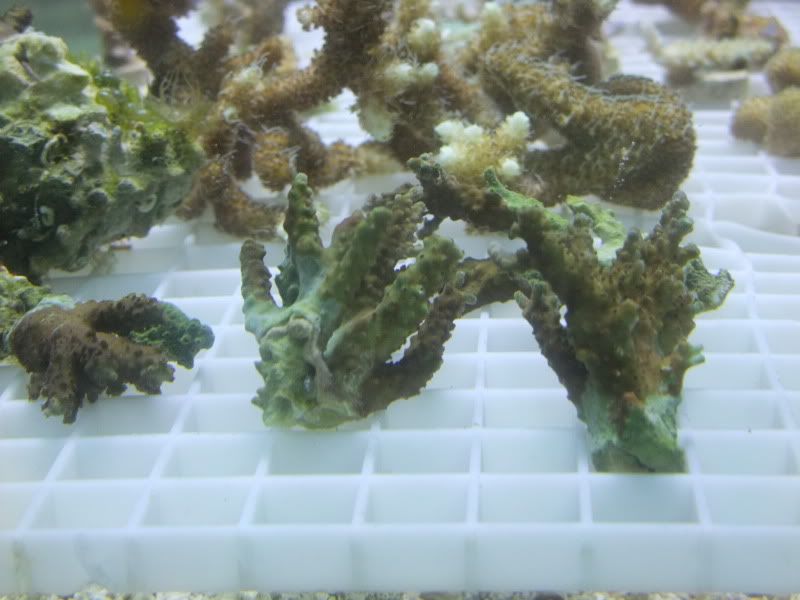 So, I decided to go for broke and treat all the acroporids I had. This left me spread out over 5 separate treatment units. Some are pictured below: With air bubbling: 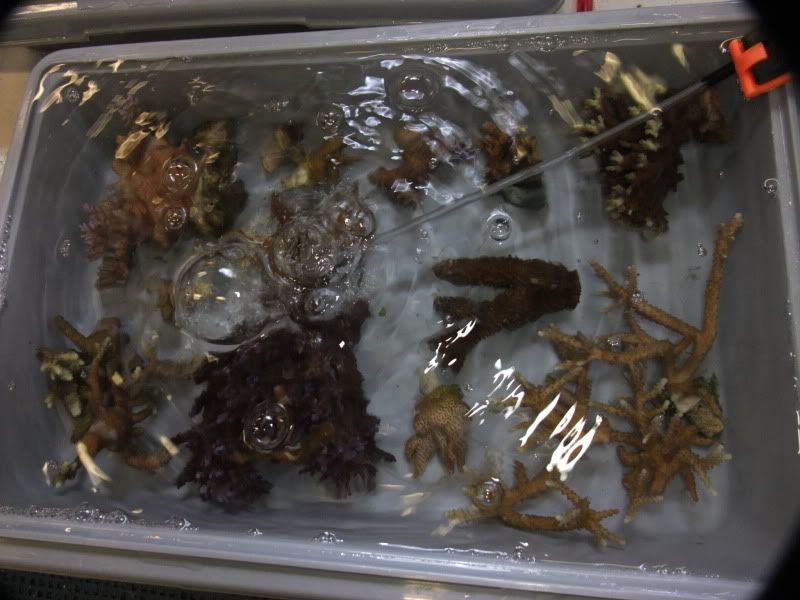 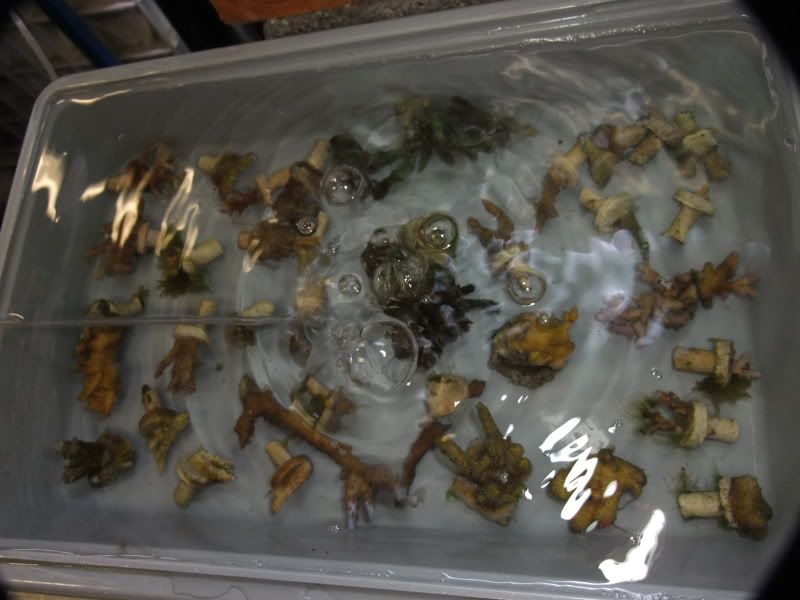 Without air bubbling: 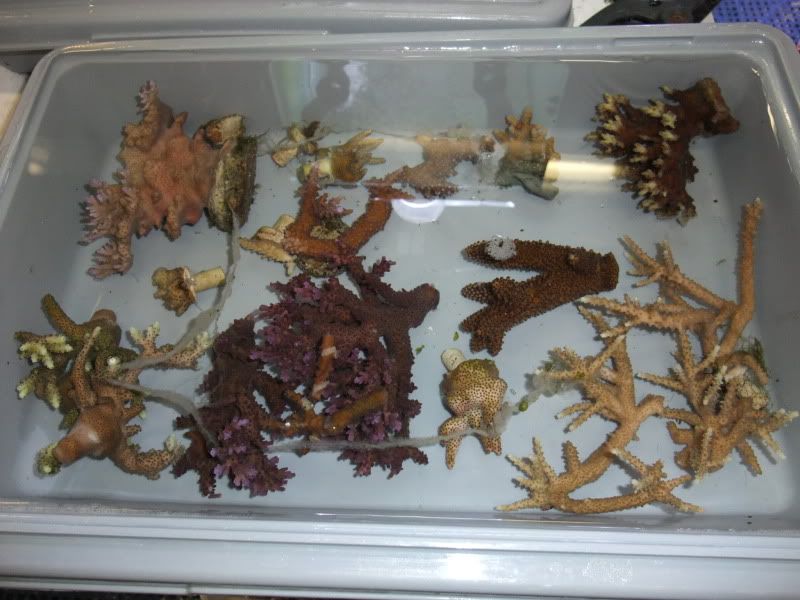 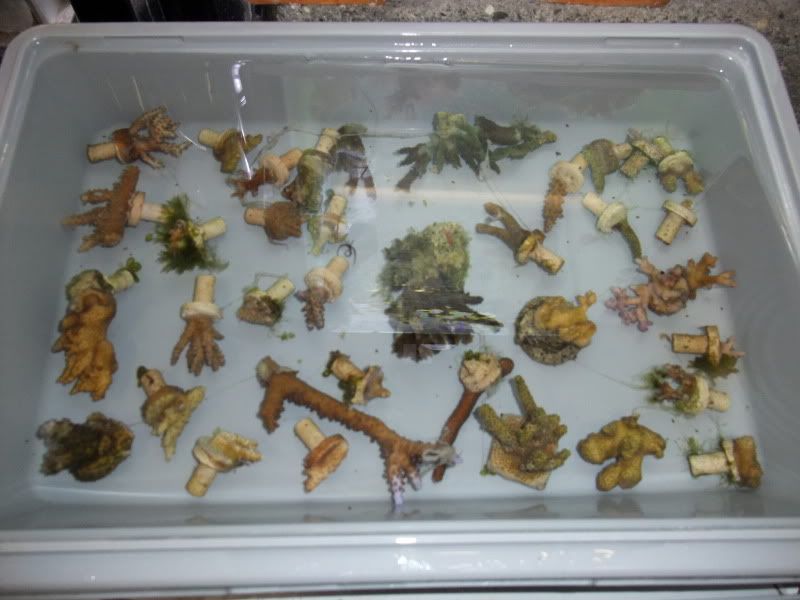 You can see how much mucous they shed during the treatment. However, it does not seem to be detrimental: 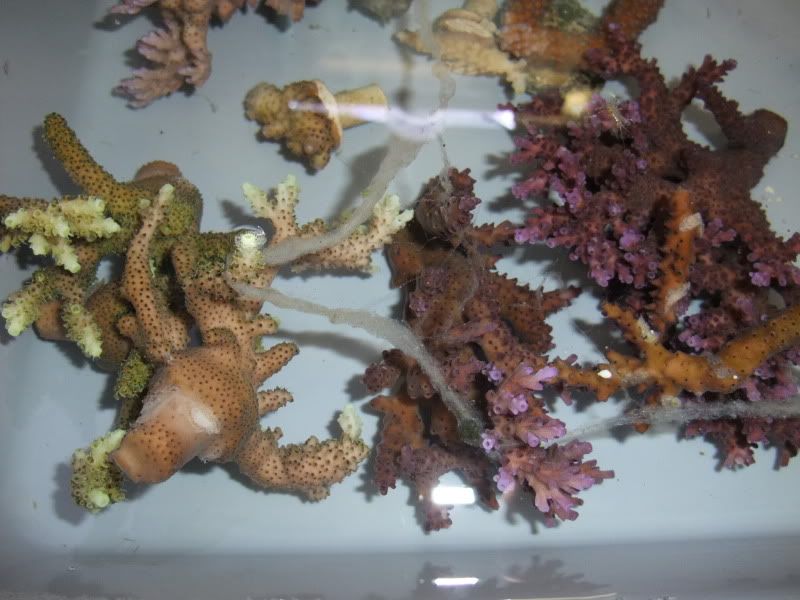 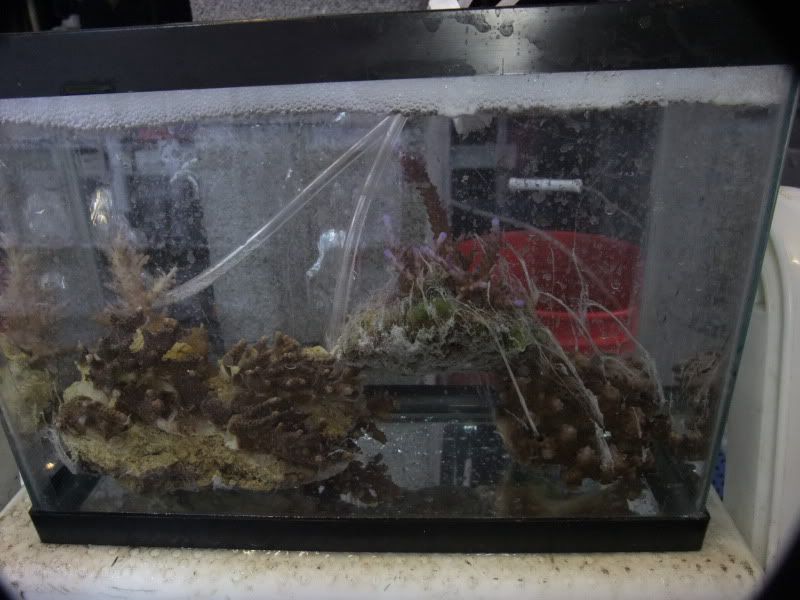 And, as I mentioned above, many of the red bugs become ensnared in the shedding and leave the coral. But, I would not say that all come off this way. After the 6-hrs is up, I still vigorously shake the coral in the treatment water first, and then I swirl it in a bucket of clean salt water. It did not take long at all for that bucket of fresh salt water to almost become saturated with various invertebrates - both large and small - falling off the coral/rocks. It's b/c of this I would advise against a whole tank treatment - unless.... someone wants to pony up his or her tank for the guinea pig...  Here most of them are (others are out of frame - and a few other misc stonies) back in the tank post treatment, the next day: 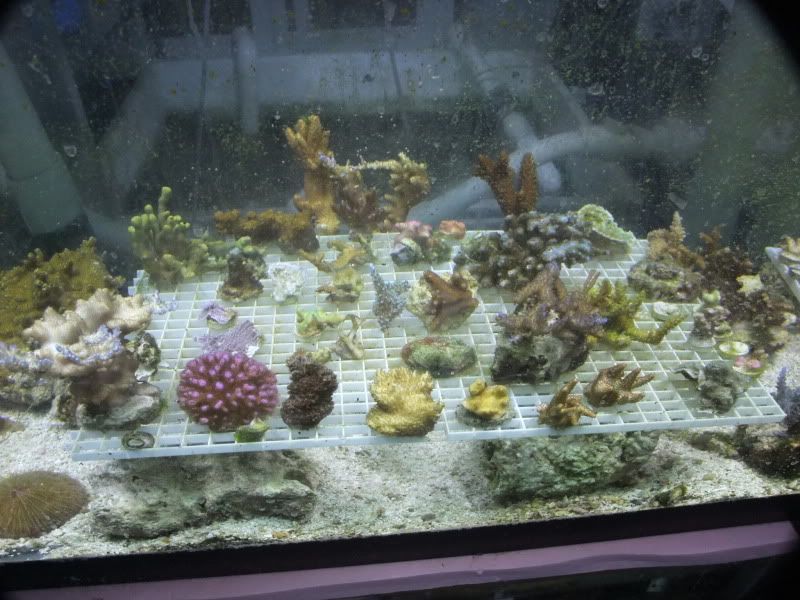 And, I was particularly concerned with those so-called "smooth-skinned" acros, like A. echinata. Here is an echinata frag the day after treatment with polyps peeking out: 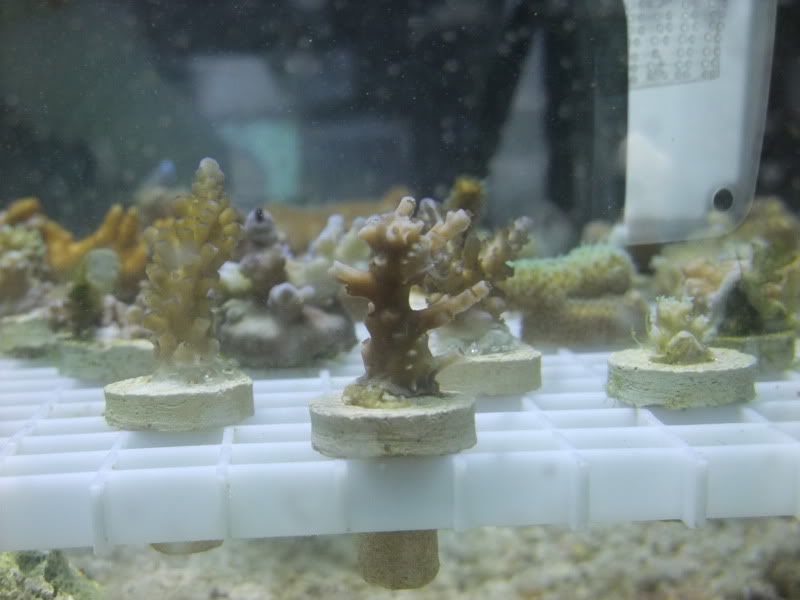 All told, I think there were over 65 different pieces, ranging in size from 1-inch frags to an almost foot-tall colony, representing about 50 species. All made it with no problems. I have not seen any RBs, but I will continue to scan for the next few weeks before I cautiously declare victory. Cheers Mike
__________________
Living is easy with eyes closed, misunderstanding all you see - John Lennon |
|
|

|
|
|
#12 |
|
Registered Member
Join Date: Dec 2005
Location: cincinnati
Posts: 701
|
So does this mean i can use Tri heart heartworm medication to treat my tank?
it has ivermectin/pyrantel in it and i have only found 1 article with someone using this heartworm med as a treatment |
|
|

|
|
|
#13 | |
|
Registered Member
Join Date: May 2006
Location: Spokane, WA
Posts: 3,852
|
Quote:
I think it was stated, several times, that ivermectin is NOT recommended as an 'in tank' treatment. |
|
|
|

|
|
|
#14 | |
|
Registered Member
Join Date: Feb 2003
Location: Washington, D.C.
Posts: 595
|
Quote:
I'm not familiar with that medication, but since it has Ivermectin as an active ingredient, I wouldn't. As returnofsid said, I stated several times that I do not think Ivermectin should be used as a whole tank treatment, due to the large amount of die-off of the other microfauna. It may have no effect on fish, but I have not tested that. If you are willing to be the guinea pig and do a whole tank treatment, be my guest. But please note that I am, at this time, only recommending Ivermectin as a bath/dip outside of the display. Again, this is largely due to my having red bugs make it through milbemycin oxime (Interceptor) treatments. Cheers Mike
__________________
Living is easy with eyes closed, misunderstanding all you see - John Lennon |
|
|
|

|
|
|
#15 |
|
Team RC Member
 Join Date: Nov 2001
Location: Rochester, NY
Posts: 41,560
|
any updates on results of your treatment?
__________________
over 24 years experience with multiple types of marine aquarium systems *see Upstate Reef Society Forum on RC and FB* GOOGLE JUNIOR'S REEF Current Tank Info: 84x24x30 265g reef past TOTM honors |
|
|

|
|
|
#16 | |
|
Team RC Member
 Join Date: Nov 2001
Location: Rochester, NY
Posts: 41,560
|
Quote:
Are there other reports of such? Are we sure it's just not a dosage/procedure issue? Thanks for your very informative thread, Mike!
__________________
over 24 years experience with multiple types of marine aquarium systems *see Upstate Reef Society Forum on RC and FB* GOOGLE JUNIOR'S REEF Current Tank Info: 84x24x30 265g reef past TOTM honors |
|
|
|

|
|
|
#17 |
|
Registered Member
Join Date: Jun 2008
Location: Stow,Ohio
Posts: 1,662
|
Very, good article and method of treatment of red bugs!
__________________
205g AGE Starfire, ATI T5 Hybrid Lighting, Octopus Extreme 3000 Skimmer, 2-Tunze 6105, 7096 Tunze Controller, 6215 Tunze Wave Maker, Tunze Osmolator, Apex Controller, GEO 618 Calcium Reactor, 285g Sys |
|
|

|
|
|
#18 |
|
Registered Member
Join Date: Feb 2003
Location: Washington, D.C.
Posts: 595
|
I have not done any varying methods, except to say that I don't see a difference in die-off of the red bugs nor do I see any corals negatively affected when using 2mls vs 4mls of Ivermectin per treatment for 6 hours - both concentrations seem to kill the bugs and not harm the corals equally well. I have mostly been using the 2mls per 10 liters (2.5 gallons) for all new acropora and montipora additions. I know montis don't harbor the bugs, but... just in case there is a confused bug...
 I assume other corals (like zoanthids and other softies) would also be fine using this treatment, but I have not tested them. To date, I have easily dipped over 100 frags of various acro and monti species and have not lost a single coral post dip. And, I also do not see any red bugs.  Re the Interceptor resistance... it's only anecdotal on my part, and I cannot point you in the direction of a particular study. However, with my own observations I can report this: - I did both whole-tank treatments and removed corals to individual treatment tanks using the large breed dog pills every time. At first, I thought perhaps my pills were expired, so I got a new batch. Red bugs still made it through both whole-tank treatments and those where I removed corals to an outside bath. On one particular occasion, I used 1/2 of a large breed pill and even left the Interceptor in the tank for 3-4 days before doing a water change or adding carbon. The bugs persisted. - All in-tank treatments were performed in a 90 gallon quarantine tank and all out-of-tank treatments were performed in 2.5 gallon tanks. - This "resistance" - if that is what it is - has been going on for almost 2 years now. - It was only after I used Ivermectin that I started to see colonies free of the bugs, but unfortunately, I believe it will need to remain an outside-of-tank usage. I have yet to test Ivermectin in a whole-tank treatment. Cheers Mike
__________________
Living is easy with eyes closed, misunderstanding all you see - John Lennon |
|
|

|
|
|
#19 | |
|
Registered Member
Join Date: Dec 2007
Location: California Central Coast
Posts: 692
|
Quote:
I hope someone will take one for the team and experiment with a whole tank treatment. It would make life much easier if we're able to treat the whole tank without having to get meds with a doctors prescription. |
|
|
|

|
|
|
#20 |
|
Registered Member
Join Date: Oct 2010
Location: Orange County California
Posts: 19
|
I have a 10 gallon quarantine tank to pony up. I'm having an issue with an unknown parasite at the moment, thought I saw a couple of redbugs, but could be an AEFW. I pulled the colony from my DT and put it in yesterday. The system has been running for about 6 months.
|
|
|

|
|
|
#21 |
|
Registered Member
Join Date: Aug 2010
Location: Arizona
Posts: 4,627
|
I was given invermectin back in Jan of 2009 by a vet at the Arizona Exotic Anaimal Hospital for treatment of red bugs. It works very well at killing any invert. I uses a much smaller dose per gallon.
__________________
__________ Current Tank Info: Past reef tanks: 20H softy, 29G mixed reef, 55G mixed reef, 40B sps dominant mixed reef and 75G sps dominant mixed reef. No tank currently |
|
|

|
|
|
#22 |
|
Registered Member
Join Date: Apr 2010
Posts: 101
|
Wow! Almost a year and no new post. I just tried the Ivermectin treatment at 2ppm (2mg/L) by adding 0.2mL of 1% ivermectin solution to 1L of tank water. I then soaked 3 of my frags in the solution for 15 minutes. The corals had polyp extension 10 mintues after the bath and it seems like most if not all of the red bugs are gone. I can't say all yet because some are stuck to the coral but watching for a few minutes and they dont seem to be moving at all. Overall, I would say that this is a very effective and quick treatment. Once I get the tank under controll I will be dipping all new additions.
|
|
|

|
|
|
#23 |
|
Registered Member
Join Date: Apr 2005
Location: Miami
Posts: 435
|
Where is the renewed interest in this thread since interceptor is off the market?
|
|
|

|
|
|
#24 |
|
Registered Member
Join Date: Nov 2003
Location: STATEN ISLAND
Posts: 7,517
|
Thanks for all the detailed work and explanation of the treatments. This will be a new avenue to explore when treating for the tiny little pest called the red bug.
__________________
Life is to short to buy frags ! But for FREE I'LL take them ><((((º>`·.¸¸.·´¯`·.¸.·´¯`·...¸><((((º> ·´¯`·.¸. , . .·´¯`·.. >((((º> LIVE SAND ITS THE CURE........® Current Tank Info: 120 CUBE Live sand Mitras lx6100hv MRC MR 2 single becket MP40 power head Aquamedic dosing pump using B-ionic |
|
|

|
|
|
#25 |
|
Registered Member
Join Date: Sep 2001
Location: Venezuela
Posts: 275
|
Unfortunately I have red bugs in all the acros, so today, I started a test with one frag with a lot of red bugs on it, I will be posting my results later today, and if this work, I have to setup a QT to keep all acro treated on Ivermectin for at least 5 days, I read this recommendation in another thread which stated that red bug do not live for more than 5 days without a host.
Ousnakebyte, thanks for all the explanation of the treatment, I am living in Venezuela (South America), and here is impossible to find Interceptor neither Sentinel, so I found this thread ultra very useful and lucky me here you can find "IVORAL" which is 0.25% Ivermectin. Thanks |
|
|

|
 |
|
|
 Similar Threads
Similar Threads
|
||||
| Thread | Thread Starter | Forum | Replies | Last Post |
| Another option for red bugs | Whisperer | SPS Keepers | 722 | 04/13/2016 02:44 PM |
| Interceptor (treat red bugs) - can it be simply praziquantel??? | vaporize | SPS Keepers | 1 | 04/18/2010 10:03 PM |
| Red Bugs | evogames | SPS Keepers | 2 | 10/17/2009 02:27 PM |
| red bugs but not red bugs but red bugs??? | sikpupy | Reef Discussion | 2 | 06/26/2009 06:49 PM |
| Red Bugs Red Bugs Red Bugs | Radiography14 | Reef Discussion | 8 | 02/21/2007 11:07 PM |